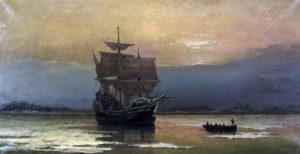September 16 — September 30, 2019
History Matters
Showing our children that their past is prelude to their future, with book recommendations
 What better way to seek religious freedom than to set sail for America? That is exactly what 102 Pilgrims did on September 16, 1620. They departed aboard the Mayflower from the English port of Plymouth, arrived in Provincetown, MA on November 21, stayed for more than a month, set sail for Plymouth, MA, and settled there.
What better way to seek religious freedom than to set sail for America? That is exactly what 102 Pilgrims did on September 16, 1620. They departed aboard the Mayflower from the English port of Plymouth, arrived in Provincetown, MA on November 21, stayed for more than a month, set sail for Plymouth, MA, and settled there.
For more information about this important event in American history, the Grateful American Book Prize recommends Caleb Johnson’s book, “The Mayflower and Her Passengers.“
****

September 17, 1862 was the bloodiest day of the Civil War; Union troops led by General George McClellan faced off against a Confederate force commanded by General Robert E. Lee at Antietam Creek in Sharpsburg, MD. It took McClellan’s soldiers approximately 12 hours to beat back the Confederates, and when the battle was over, 26,000 men were dead, wounded or missing. Some scholars say the Civil War was the country’s most important conflict, because it divided the relatively new United States by threatening to undo all past accomplishments.
Young people need to better understand how the War Between the States was fought, and why its end was a definitive win for all Americans. The Grateful American Book Prize recommends Phillip Thomas Tucker’s “Miller Cornfield at Antietam: The Civil War’s Bloodiest Combat.“
****
 The notion that aircraft could play an important role in wartime became a fact during World War I, but the U.S. Army didn’t establish the Army Air Corps until 1926. It took another war–World War II–for aerial combat to receive the recognition it deserved when, nearly two years after VE Day, the U.S. Air Force was created as an independent branch of service.
The notion that aircraft could play an important role in wartime became a fact during World War I, but the U.S. Army didn’t establish the Army Air Corps until 1926. It took another war–World War II–for aerial combat to receive the recognition it deserved when, nearly two years after VE Day, the U.S. Air Force was created as an independent branch of service.
For more information the Grateful American Book Prize recommends Chester G. Hearn’s “Air Force: An Illustrated History: The U.S. Air Force from 1910 to the 21st Century.”
****
 In 1775 Nathan Hale, a Connecticut schoolteacher, joined the Continental Army. Captain Hale was a dedicated soldier intent on defending his country. His devotion led him to volunteer for dangerous missions to fend off British aggression–a desire that would cause his demise. On September 10, 1776, he was sent behind enemy lines in Long Island, NY, disguised as a Dutch schoolmaster, working on behalf of General George Washington. The junket was a success, but as he made his way to American-controlled territory on the night of September 21, he was caught and searched by his British captors. They found that the 21-year-old patriot was carrying incriminating documents. A swift death sentence was levied, and the next day he was taken to the gallows. Hale is remembered for what he is believed to have said just before he was hanged: “I only regret that I have but one life to give for my country.”
In 1775 Nathan Hale, a Connecticut schoolteacher, joined the Continental Army. Captain Hale was a dedicated soldier intent on defending his country. His devotion led him to volunteer for dangerous missions to fend off British aggression–a desire that would cause his demise. On September 10, 1776, he was sent behind enemy lines in Long Island, NY, disguised as a Dutch schoolmaster, working on behalf of General George Washington. The junket was a success, but as he made his way to American-controlled territory on the night of September 21, he was caught and searched by his British captors. They found that the 21-year-old patriot was carrying incriminating documents. A swift death sentence was levied, and the next day he was taken to the gallows. Hale is remembered for what he is believed to have said just before he was hanged: “I only regret that I have but one life to give for my country.”
For more information, the Grateful American Book Prize recommends Shannon Zemlicka’s “Nathan Hale: Patriot Spy.”
History Matters is a biweekly feature courtesy of The Grateful American Book Prize.




